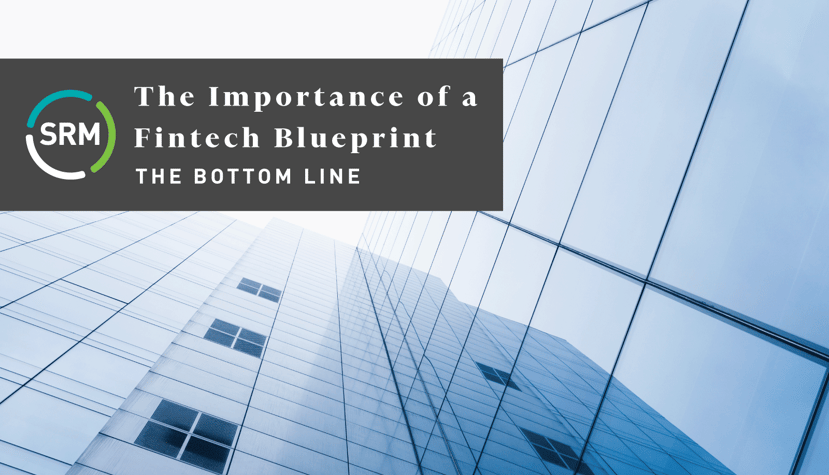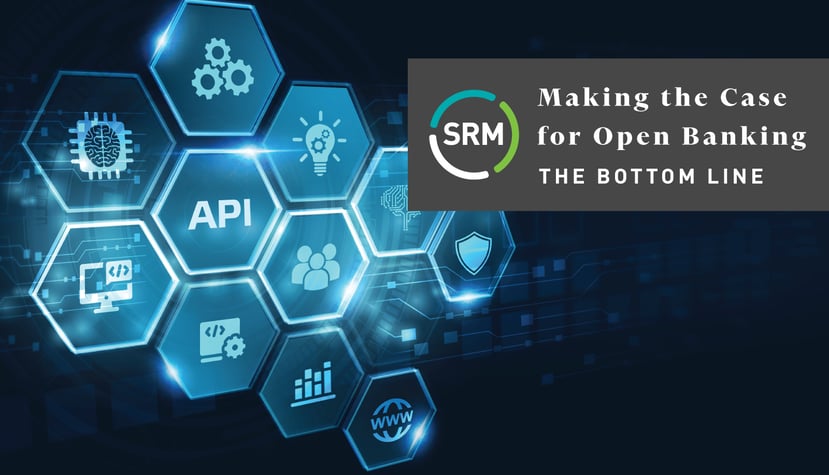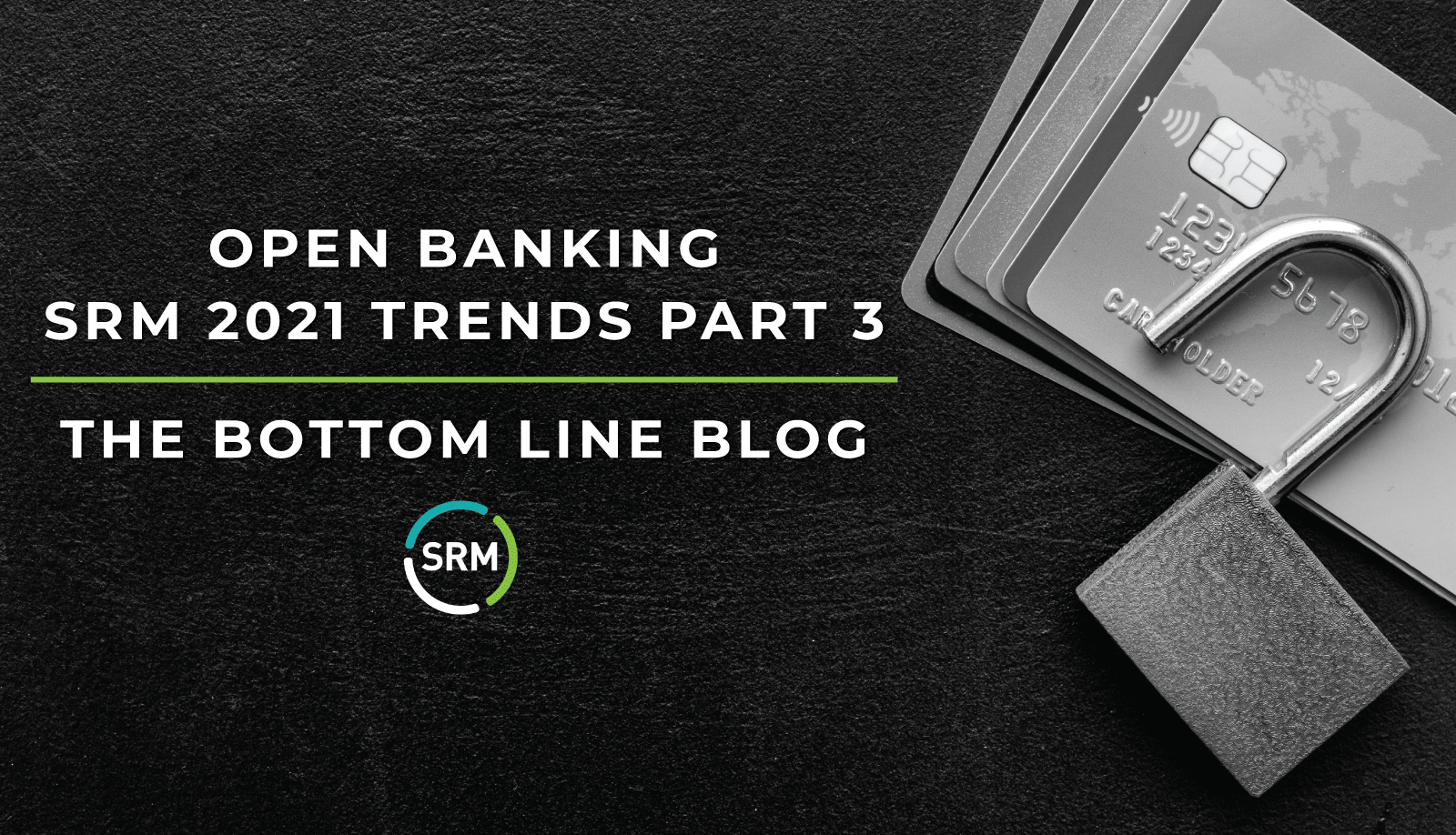
Most banks and credit unions will claim to have a “fintech strategy,” but their plans are often rudimentary at best. Those who went the extra mile to build plans with greater specificity were rewarded when the pandemic spurred a need to transition operations and customer engagement to digital channels. Much like disaster recovery planning, the payback only becomes apparent in hindsight.
Read More
Topics:
Open Banking,
Fintech,
Vendor Contract,
Strategy,
Early Warning,
Paze

I recently attended the Fintech + Insurtech Generations conference in Charlotte, N.C., which brings together visionaries across the broad spectrum of finance and technology.
Read More
Topics:
Payments,
Open Banking,
Digital Assets,
Blockchain,
Regulation
![CFPB-WP-Blog-Image[30]](https://blog.srmcorp.com/hs-fs/hubfs/CFPB-WP-Blog-Image%5B30%5D.png?width=829&height=475&name=CFPB-WP-Blog-Image%5B30%5D.png)
Shifts in the regulatory landscape carry significant impacts on banks, credit unions, and the fintech companies that are part of a growing ecosystem. The most-active agency in recent months has been the Consumer Financial Protection Bureau (CFPB). There's little reason to expect the CFPB to slow its pace in 2023, aggressively enforcing existing rules and angling to expand its jurisdiction.
Read More
Topics:
Open Banking,
Fintech,
Vendor Contract Negotiation,
Bank Vendor Management,
Credit Union Vendor Management,
BaaS,
CFPB

Open banking gives third-party financial service providers open access to consumer banking, transactions, and other financial data through application programming interfaces (APIs). It allows for the networking of accounts and data across institutions for use by consumers, FIs, and third-party service providers, according to Investopedia.
Read More
Topics:
Open Banking,
Digital Banking,
Vendor Contract Negotiation,
Bank Vendor Management,
Credit Union Vendor Management,
Embedded Finance,
Embedded Fintech

In two previous blogs, SRM detailed the top trends we see driving 2021’s financial services landscape. In this final Trends post, we turn our attention to an emerging one we have observed on both sides of the Atlantic, Open Banking.
Read More
Topics:
Open Banking,
APIs,
Bank Vendor Management,
Direct Deposit,
Bank Consulting,
Credit Union Consulting

A colleague of mine once said, “God was able to create Heaven and Earth in six days because He did not have an installed base of users.” Anyone who has spent any time in the software business understands this axiom all too well.
This is essentially the premise behind technical debt. As soon as your institution commits to a solution and begins adding customers or members to it, constraints emerge making it difficult to enhance or upgrade the technology.
Read More
Topics:
Open Banking,
APIs,
Technical Debt

One year ago, almost to the day, Fiserv surprised the payments world by announcing its acquisition of First Data, setting off a wave of payments consolidation that by midyear had narrowed a list of six leading processors and bank service providers down to three. Following this flurry of activity, it was widely assumed that FIS, Global Payments and Fiserv would be occupied with integration tasks for the foreseeable future, potentially leaving payments M&A destined for a short breather. But wait – there’s more.
Read More
Topics:
Open Banking,
Fintech,
Payments Consolidation,
Visa,
Plaid

One of the hottest topics in banking – for financial institutions as well as third-party providers – is data sharing. Banks and credit unions possess terabytes of such information; many organizations that are not financial institutions covet access to this data to increase the value they bring to consumers. This value could manifest in many ways, from a simpler customer experience to providing personalized offerings that anticipate the user’s need.
Read More
Topics:
Open Banking,
Date Sharing

In a recent blog post, we outlined the lessons learned in the year since the UK’s Open Banking regulation took effect. The Open Banking concept is hardly confined to Great Britain, however. Countries as geographically and culturally diverse as Singapore, Australia, Holland and Canada have also embarked on similar endeavours to alter the dynamics of their financial services sectors – thus also altering other interconnected sectors.
Although it’s difficult to envision a similar top-down mandate in the United States, there is growing evidence that many of Open Banking’s features will become part of the American landscape through other means. Yet, depending on where you look, commentators cannot agree on the impact of Open Banking’s introduction in the U.S., whether it be success, failure, positive or negative.
Read More
Topics:
Strategic Sourcing,
Payments,
Innovation,
Open Banking,
Fintech


![CFPB-WP-Blog-Image[30]](https://blog.srmcorp.com/hs-fs/hubfs/CFPB-WP-Blog-Image%5B30%5D.png?width=829&height=475&name=CFPB-WP-Blog-Image%5B30%5D.png)








